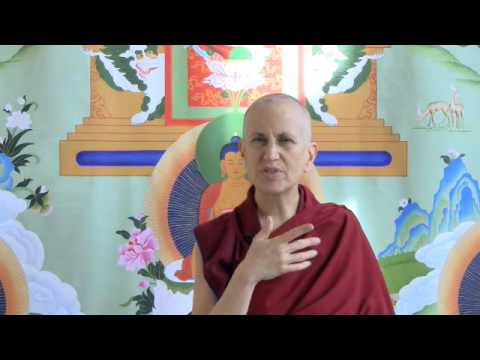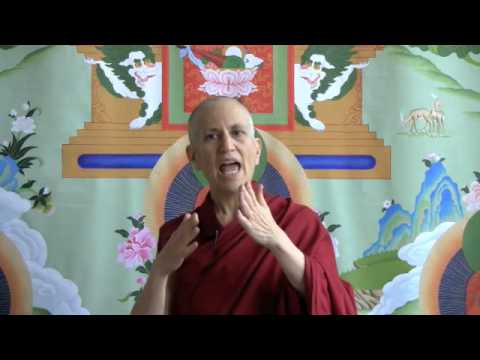Deity practice
Front-generation versus self-generation
Part of a series of Bodhisattva's Breakfast Corner talks given during the Green Tara Winter Retreat from December 2009 to March 2010.
- The difference between self-generation and front-generation
- The initiation and permission needed for self-generation deity practice.
Green Tara Retreat 018a: Front- versus self-generation (download)
Audience: What’s the difference between the front-generation and the self-generation of Tara?
Venerable Thubten Chodron (VTC): When you have at least taken what’s called the wang, or a full initiation (which is usually a two-day thing), and afterwards you take a jenang or a permission (which is a shorter ritual, shorter ceremony or shorter meditation, however you want to say it), then you have the permission to do the self-generation. Self-generation means to generate yourself as the deity. But to have permission to do that you have to have had a full initiation, which could be in another deity, before you take the permission in this one. If you don’t have that, or you have nothing, or you just had the jenang (the permission), then without a previous initiation you do the front-generation practice thereby visualizing the deity in front. The people who do the self-generation start out with the deity in front and then the deity absorbs. The crucial element there is that you meditate on emptiness, and then your own wisdom reappears as the deity. Unless you’ve received the proper prerequisites, then don’t do that meditation: do the front generation.
Audience: In the Tara practice, when we’re doing the part about breathing in and breathing in the suffering and breathing out the happiness, can we think of specific people, like when we do tonglen?
VTC: Of course, it’s always good to think of all sentient beings, and then you can think of specific people that you know who are facing different difficulties in this particular moment. I think it’s helpful for us, although there are specific people that we know having specific problems now, to keep in mind that just because somebody isn’t having specific problems doesn’t mean that their situation is all okay. As long as we’re in samsara we have the pervasive conditioned dukkha, and with the slightest change of circumstance then there are outright problems and suffering.
Venerable Thubten Chodron
Venerable Chodron emphasizes the practical application of Buddha’s teachings in our daily lives and is especially skilled at explaining them in ways easily understood and practiced by Westerners. She is well known for her warm, humorous, and lucid teachings. She was ordained as a Buddhist nun in 1977 by Kyabje Ling Rinpoche in Dharamsala, India, and in 1986 she received bhikshuni (full) ordination in Taiwan. Read her full bio.


